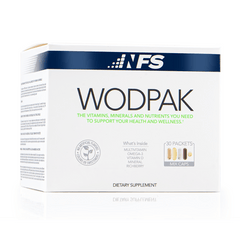
Can Multivitamins Help with Hormonal Balance?
Key Takeaways
Can multivitamins help with hormonal balance?
Multivitamins can support overall health and provide nutrients that play a role in hormone regulation.
You might crush your workouts, eat clean, and still wonder why your energy’s tanked or your sleep’s off. Here’s a not-so-secret player behind the scenes: hormones. These biochemical messengers aren’t just about puberty or fertility. They’re the command center for your metabolism, mood, focus, stress, and even your drive to move. When they’re in sync, life hums. And when they’re off? You feel it hard.
At NF Sports, we believe optimal performance starts with internal balance. That’s why we champion science-backed nutrients and clean, high-performance formulas that help your body function like the powerhouse it was built to be. In this article, we break down the key vitamins, minerals, and lifestyle moves that support hormonal harmony so you can feel focused, energized, and ready to crush your goals without compromise.
Why Hormones Matter
Hormones influence nearly every function in the body, from metabolism and energy levels to mood, sleep, and stress management. When they’re balanced, you feel strong, focused, and energized. When they’re not, a range of symptoms can appear:
-
Fatigue: Persistent sluggishness, even after a full night’s rest
-
Mood Swings: Irritability, anxiety, or unexplained low moods
-
Weight Fluctuations: Difficulty losing or maintaining weight despite a healthy diet
-
Low Energy and Libido: Reduced motivation and diminished drive
-
Sleep Disturbances: Difficulty falling asleep or staying asleep throughout the night
Diet, stress levels, and lifestyle choices all impact hormonal health, but specific vitamins and minerals also support the endocrine system. Choosing a well-formulated multivitamin can provide targeted nutrients to promote balance and enhance overall well-being.
How Nutrients Influence Hormonal Balance
Micronutrients regulate hormone production, signaling, and metabolism. Deficiencies in key vitamins and minerals can negatively affect energy levels, mood, and overall hormonal function.
1. Vitamin D—A Hormonal Powerhouse Buy Now
Vitamin D functions as a prohormone, directly influencing testosterone, estrogen, and cortisol. Many people don’t get enough, especially during colder months or when sun exposure is limited.
-
Regulates cortisol, preventing excessive stress responses
-
Balances testosterone and estrogen, supporting reproductive health
-
Boosts immune system function and enhances bone strength
-
Inadequate intake of Vitamin D may affect mood, energy, and metabolism.
Sources: Sunlight is the best source, but fortified foods and supplements are often necessary. Look for Vitamin D3 in a multivitamin, as it is the most bioavailable form.
2. B Vitamins—Metabolism, Mood, and Energy
B-complex vitamins are essential for energy production, neurotransmitter function, and hormone regulation. Low levels can contribute to sluggishness, poor focus, and mood instability.
-
Vitamin B6 (Pyridoxine): Supports serotonin and dopamine production for mood stability
-
Vitamin B12: Crucial for brain function, red blood cell production, and energy metabolism
-
Folate (B9): Helps regulate estrogen and supports reproductive health
Sources: Leafy greens, eggs, fish, and whole grains contain B vitamins, but supplementation may be necessary to maintain optimal levels.
3. Magnesium—Stress and Sleep Regulation
Magnesium plays a crucial role in managing stress, promoting relaxation, and maintaining proper muscle function.
-
Regulates cortisol, reducing chronic stress effects
-
Supports progesterone, estrogen, and testosterone production
-
Improves sleep quality, promoting better recovery from daily stressors
Sources: Found in nuts, seeds, spinach, and dark chocolate. Many people benefit from supplementation, especially if experiencing stress or poor sleep.
4. Zinc—Testosterone and Immune Function
Zinc is vital for testosterone production, immune function, and metabolic processes.
-
Boosts natural testosterone production
-
Prevents hormone imbalances that contribute to fatigue and mood swings
-
Supports immune function and wound healing
Sources: Red meat, shellfish, and legumes provide zinc, but a high-quality multivitamin can help maintain adequate intake.
5. Omega-3 Fatty Acids—Inflammation and Hormone Stability
Chronic inflammation disrupts hormonal balance. Omega-3 fatty acids help regulate insulin, reduce inflammation, and support brain function.
-
Supports thyroid function and hormone production
-
Promotes mood stability and cognitive function
-
Reduces inflammation, which can interfere with hormone signaling
Sources: Fatty fish, flaxseeds, walnuts, and fish oil supplements provide Omega-3s in bioavailable forms.
6. Adaptogenic Herbs—Natural Stress Support
Adaptogenic herbs like ashwagandha, maca root, and rhodiola help the body adapt to stress while promoting hormonal stability.
-
Helps the body respond to stress, supporting natural hormonal function.
-
Supports adrenal and thyroid function, optimizing hormone production
-
Regulates menstrual cycles and testosterone levels, supporting reproductive health
Sources: Available in herbal teas and specialized supplements formulated for stress and hormone balance.
Additional Nutrients That Support Hormonal Health
Beyond the essential vitamins and minerals already discussed, several other nutrients play a role in maintaining hormonal balance:
-
Iodine: Essential for thyroid hormone production and metabolism regulation
-
Selenium: Works alongside iodine to support thyroid function and protect against oxidative stress
-
Iron: Necessary for oxygen transport and hormonal function, especially in menstruating women
-
Vitamin C: Supports adrenal function and helps regulate cortisol levels
Including these nutrients in your diet, either through whole foods or supplements, can further promote hormonal equilibrium.
Lifestyle Strategies for Hormonal Wellness
While a well-balanced multivitamin provides foundational nutrients, lifestyle habits also contribute to long-term hormonal health.
-
Exercise regularly: Strength training and cardiovascular workouts regulate insulin and cortisol levels, promoting hormonal stability.
-
Eat whole foods: A nutrient-dense diet with protein, healthy fats, and fiber promotes stable blood sugar and hormone production.
-
Get quality sleep: Aim for seven to nine hours per night to allow the body to reset and restore hormonal balance.
-
Manage stress effectively: Incorporate meditation, deep breathing, or yoga to keep cortisol levels in check and improve overall hormonal function.
-
Limit endocrine disruptors: Reduce processed foods, alcohol, and synthetic chemicals found in personal care products, which can interfere with hormone signaling.
The Takeaway
Achieving hormonal balance requires more than a single solution. The right combination of nutrients, lifestyle habits, and self-care practices creates a foundation for long-term well-being. A high-quality multivitamin can help bridge nutritional gaps, supporting metabolism, energy levels, and overall health.
However, supplementation should be part of a larger strategy that includes a nutrient-rich diet, regular movement, stress management, and proper sleep. When combined, these elements create an environment where hormones can function optimally.
At NF Sports, our commitment is to clean, effective supplementation. No artificial fillers, no misleading claims, just science-backed nutrition for real results.
Ready to take charge of your hormonal health?
Balancing your hormones isn’t about chasing trends. It’s about dialing in the essentials: nutrient support, smart lifestyle habits, and consistent recovery. A high-quality multivitamin helps fill in the gaps, but pairing it with targeted tools like WODPAK™ gives your body the extra edge it needs to perform and recover at its best. With clean, efficient dosing that covers vitamins, minerals, omega-3s, and more, WODPAK isn’t just another pack. It’s your daily dose of dominance. Learn more about the WODPak here.
FAQ
What vitamins are essential for hormonal balance?
Key vitamins include Vitamin D (supports cortisol and reproductive hormones), B vitamins (regulate mood and energy), and magnesium (reduces stress and improves sleep).
How do multivitamins support hormone health?
Multivitamins help fill nutrient gaps that affect hormone production, improving energy, metabolism, and mood while reducing stress-related imbalances.
Can magnesium help with hormonal imbalance?
Yes, magnesium regulates cortisol (stress hormone), improves sleep, and supports the production of estrogen, progesterone, and testosterone.
What are the benefits of adaptogenic herbs for hormones?
Adaptogens like ashwagandha and maca root help balance cortisol, support adrenal health, and regulate reproductive hormones.
What lifestyle changes improve hormonal balance?
Regular exercise, a whole-food diet, quality sleep, and stress management (like meditation) are key for maintaining balanced hormones.
Are there specific multivitamins designed for hormonal health?
Yes, some multivitamins contain hormone-supportive nutrients and adaptogens to help regulate energy, metabolism, and overall well-being.




